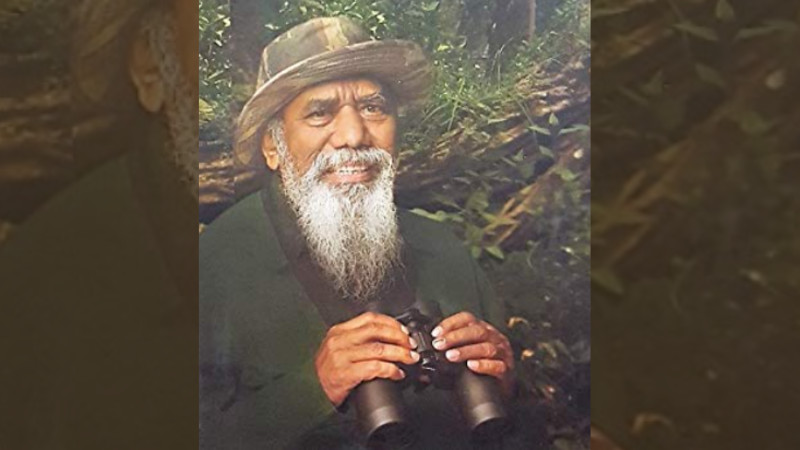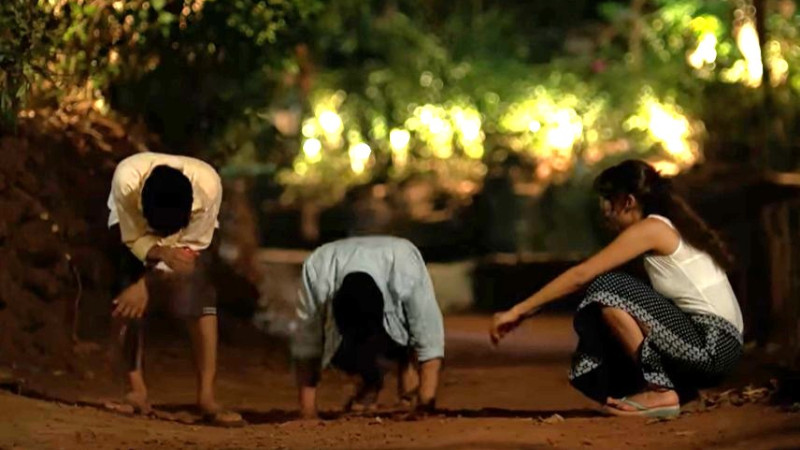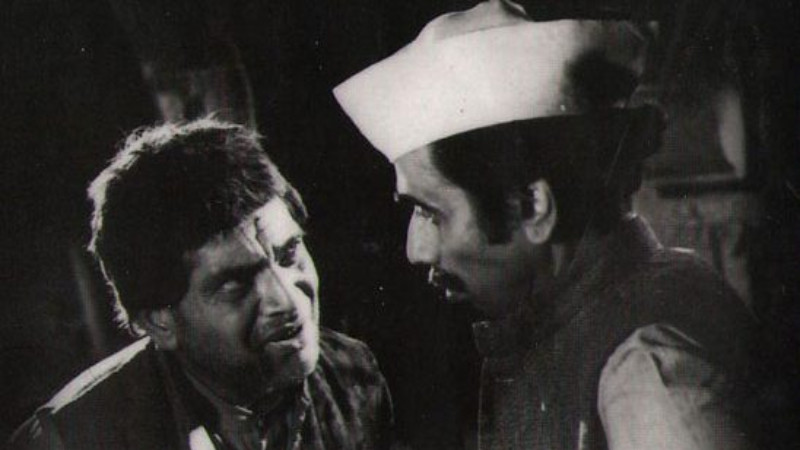Your book ‘Navegav Bandhche Divas’ simply put a spell on me. Especially the chapter about the nest of a Meenkhai Ghar. Meenkhai Ghar or Kaikar (Western Osprey) does not breed in our region, but you had mentioned to have seen its nest in Navegav Bandh. That bird could be easily seen at the lake in my town. I was so sure it’s nest must be around somewhere. I explored a large part of the Ajanta Hill range in search of its nest. After much effort, I found a very large nest fitting the description in your book, on a steep basalt cliff.
Honourable Dear Maruti Chitampalli
There is a special reason for my writing this letter to you.
In the last two years, the Sadhana Saptahik offered me fellowship twice. The first time to study the role of birds in the Jowar farms, and the second time for expanding my scope to animals frequenting farms. They published my studies in special issues of Sadhana Weekly. The editor of Sadhana reached out to me in April this year to ask if I could continue studies in this field and bring more relevant information to light. He also told me that if I had a suitable research topic in mind, I should pursue it, and later he’d see if my work could be published in Sadhana. I immediately told him I wanted to study your work closely, conduct an in-depth interview with you, and find a new direction for my studies. It was on my mind since the Padmashri was awarded to you recently. Editor agreed, asked me to research well in depth, then talk to you in July /August and write a long article, possibly for the Diwali Issue.
I was overjoyed. I relished the opportunity to meet and talk to the person whose writings inspired me to love and enjoy nature, to wander, to observe keenly, to experience nuances, to document and to research. My prep was going well. And last night, all of a sudden, to my utter dismay, I learned, you passed…
Sir, even though I could never meet you in person and now there’ll be no chance, I know you since the last 18 years, when I read your writing for the first time, in the chapter “Adai Ani Tichi Pile” from Marathi textbook of 7th standard. Our teacher Sartale bai had taught it from heart. That single textbook chapter made me fall in love with your style, I am not exaggerating, it really did. There was a brief bio with the chapter, containing the names of a few of your books. I memorized it.
When I came home from school that day, I spoke to my father about the chapter and about you. My father was a member of the one and only public library in our town. He asked me to go to the library to find your books. My father was a wise man. He would make me read books by promising me a tempting reward. This time he didn’t have to bribe me; I wanted to read! So I went to the library, met the elderly librarian, Kasar Baba, and asked for books by Maruti Chitamapalli. He told me the library had only one book, and that he didn’t remember where it was kept. But he handed me the entire catalogue of the library and I browsed through it for about an hour to find ‘Ranwata’. I met you for the second time through this book. I simply loved it.
I checked the catalogue again and again to see if I missed another book by you mentioned there, but there wasn’t any. Someone told me to ask Vikram Patil Sir – a teacher who taught the higher classes in our school. I asked him if he had any of Maruti Chitampalli’s books, and if yes, if I could borrow them. He lent me the book ‘Jangalacha Dena’ on one condition, that I must write at least a couple of pages about the book after I read it. I devoured the book in one sitting – my third encounter with you.
Your books captivated my mind. I was so impressed by your writing, that I started to go on nature walks and jungle trails to observe the everyday natural phenomena. Next year, I won a cash prize in some competition, and I had some money saved from when elderly guests gave me money as a token of affection. I used that money to buy nine books written by you. I read them all many, many times. I kept coming back to your books, time and time again, and slowly, I felt like we are building a bond.
Dear Chitampalli Sir, later your book ‘Navegav Bandhche Divas’ simply put a spell on me. Especially the chapter about the nest of a Meenkhai Ghar. Meenkhai Ghar or Kaikar (Western Osprey) does not breed in our region, but you had mentioned to have seen its nest in Navegav Bandh. I knew that Meenkhai Ghar could be easily spotted at the lake in my town, too. Hence, I was determined to find its nest - just like you did. I explored a large part of the Ajanta Hill range in search of the nest. At long last, I did find a large nest fitting the description in your book, on a steep basalt cliff.
I was crazy with joy. I observed that nest for many days, but never did a single bird wander there. I kept looking for a similar nest, and found one after some days. On the same day, a huge bird came to the nest bearing two large sprigs (almost small branches!). I was delighted. But when the euphoria subsided, I realized it was not the Osprey, but Bonelli’s Eagle. I was fascinated by its elegance, its size, its sharp beak, and sharper eyes. I felt compelled to observe it. I made a bookful of notes about the eagle that day! Recently, when I revisited my notebooks from those days, I realized it was my first sighting of Bonelli’s Eagle. 22th February 2012 – when I was in 11th standard.
I realize today that my notes from back then were inspired by your literary style; they were not just objective or descriptive, but they tried to capture the beauty of the scene, the birds, the nature in general. I am sure, it was not just me, but hundreds and thousands like me, not only from Maharshtra, but all over India, and even outside the country were inspired by you, to become birdwatchers, nature lovers ecologists and wild life researchers / photographers.
Through independent writing and translations, you wrote about 20 important books that are not only literary wonders, but also authentic reference material. 'Pakshi Jay Digantara', 'Gharatya Palikade', 'Navegaon Bandhche Divas', 'Suvarna Garud', 'Ranwata', 'Ratwa', 'Nisargavachan', 'Shabdanch Dhan', 'Kesharacha Paus', 'Jangalach Dena', 'Chaitrapalavi', 'Jangalachi Duniya', 'Chakava Chandana: Ek Vanopanishad', 'Pakshikosh' – to name a few. You did not stop there, you continued working on encyclopedic catalogues of animals, trees and fish. (Parnikosh, Vrukshkosh, and Matsykosh) till your last breath. Your brand of unwavering commitment evokes respect in minds of students like me.
Sir, such Encyclopedic Compilations and Field Guides are usually the teamwork of researchers, observers and scientists. But you compiled the highly informative Pakshikosh containing in-depth information of 554 birds, their photographs and their names in 25 different languages-dialects in India. To top it, you compiled it all by yourself, and that’s no ordinary feat! Your compilation and your books have added many more words and terms in Marathi vocabulary. We cannot thank you enough for it. Perhaps that’s the reason readers adored your work, and governing bodies conferred many awards and honours upon you.
Some of your work like 'Vanaranchi Shekoti' (The Monkeys’ Bonfire), 'Sapanan Kadhlela Awaaz' (The Sound Made by a Snake), 'Mashyancha Ranjan' (A Urn of Fish), 'Aswalachi Bhakari' (The Bear’s 'Bhaakri'), 'Neelgaine Khalllela Kasav' (The Tortoise Eaten by a Nilgai) was criticized, but nobody put in an effort to research and refute your claims. But some of your claims can now be proven right, with the modern observations and documentation technology.
Presenting scientific knowledge about nature in a simple and graceful Marathi is not an easy task. Many writers have explored nature-writing with various approaches, and they have done it well. But combining science and literary grace is the uniqueness of your writings. Of course this has its roots in your deep knowledge of languages and nature, in the Indian and foreign books you read, in the information you collected from aboriginal tribal hunters, in your consistent research and in your unique point of view of translations. You truly established 'Nature and Environment Writing' as an independent genre in Marathi literature.
You helped bring out the traditional stories, beliefs, and observations about nature from tribal communities, along with formal scientific knowledge. You used the platforms of various regional, state or national literary conferences, seminars, and workshops about environment and nature to do so. In spite of staying in the limelight for your work, you never let your bond with the jungle and people wither. True to your work ethic and research methodology, you have given due credit to specific tribals for their contributions.
Akin to world literature, Marathi literature, too, is growing in scope. New genres are coming out. Some literary trends, despite having great potential for growth, have not become as powerful as they should. For example Gazal – established in Marathi by Suresh Bhat, and Science Fiction, popularized by Jayant Naralikar.
You spent more than five decades in the company of jungles and books. Even the three decades of government service. You truly were the sage of the woods – (Arnaya Rishi) Your love for nature was not limited to wanderlust and writing. Your contribution to shaping the Karnala Bird Sanctuary, Navegav Bandh National Park, Wildlife Sanctuary at Nagjhira, Melghat Tiger Reserve etc. is unparalleled. It helped the governing bodies to develop policies.
Your stories like 'Arani', 'Hathi Pagadi', 'Adai Ani Tichi Pilan', 'Tanmorache Divas', 'Gulabi Pis', 'Meenkhai Gharichan Gharatan', 'Mornachi', 'Bhiva Dhivar Ani Mase', 'Madhavzharichi Chittarkatha', 'Ranbhul', 'Kesharacha Paus', 'Tekaraj', 'Mrutyuche Sanmohan', 'Panghal', 'Na Umalalelya Kalya' have cast a spell on minds of many of your readers. They have enriched our lives. You told us what the birds talk, how the animals live, what matters to trees, and what the true nature of the jungle is. Be it birds, bees, fish, trees, animals, hills or rivers; you made them all talk to us. Generations of people learned to communicate with nature under your guidance. Today when people write about their experiences in the wild, there is an unmistakable influence of your work on them. Readers mimicking an author is the greatest testimonial of the author’s accomplishments.
Great authors enrich and influence readers’ lives without ever meeting them in person. When they pass, society has to endure an irreparable loss. The society, the world of literature, and the environmental movement; are all grieving you. I said, we can never meet now, but even that is not true. We’ll keep finding you in the pages of your books.
We Maharashtrians are lucky to have had a legend like you living amongst us. For every single person who wants to speak the language of nature, wants to live with nature, and wants to write about environmental science in graceful Marathi, you will always be a guiding light!
Fare thee well, respected Sir!
Yours Truly,
A humble reader who loves every word you wrote….
- Vivek Wage
vivekwaghe28@gmail.com
(Author is an Environment Researcher and Writer)
The Article was originally published in Sadhana Weekly's Issue dated 28 June 2025. You can read it here
अरण्यऋषी मारुती चितमपल्ली यांना एका तरुणाचे अनावृत पत्र
Tags: Vivek Waghe Nature Writing Wanderlust Birdwatching Sanctuary Karnala Nagjhira Navegaon Bandh Marathi Literature Conservationalist Nature Environment मारुती चितमपल्ली विवेक वाघे ललित साहित्य निसर्ग मराठी निसर्ग-साहित्य पर्यावरण sadhana digital साधना डिजिटल डिजिटल साधना Load More Tags






























Add Comment